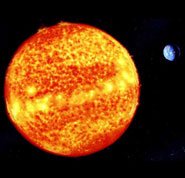IS THERE A GOD?

IS THERE A GOD?
Does God exist? Here are six straightforward reasons to believe that God is really there.
Just once wouldn't you love for someone to simply show you the evidence for God's existence? No arm-twisting. No statements of, "You just have to believe." Well, here is an attempt to candidly offer some of the reasons which suggest that God exists.
But first consider this. When it comes to the possibility of God's existence, the Bible says that there are people who have seen sufficient evidence, but they have suppressed the truth about God.1On the other hand, for those who want to know God if he is there, he says, "You will seek me and find me; when you seek me with all your heart, I will be found by you."2 Before you look at the facts surrounding his existence, ask yourself, If God does exist, would I want to know him? Here then, are some reasons to consider...
1. The complexity of our planet points to a deliberate Designer who not only created our universe, but sustains it today.
Many examples showing God's design could be given, possibly with no end. But here are a few:
The Earth...its size is perfect. The Earth's size and corresponding gravity holds a thin layer of mostly nitrogen and oxygen gases, only extending about 50 miles above the Earth's surface. If Earth were smaller, an atmosphere would be impossible, like the planet Mercury. If Earth were larger, its atmosphere would contain free hydrogen, like Jupiter.3 Earth is the only known planet equipped with an atmosphere of the right mixture of gases to sustain plant, animal and human life.
 The Earth is located the right distance from the sun. Consider the temperature swings we encounter, roughly -30 degrees to +120 degrees. If the Earth were any further away from the sun, we would all freeze. Any closer and we would burn up. Even a fractional variance in the Earth's position to the sun would make life on Earth impossible. The Earth remains this perfect distance from the sun while it rotates around the sun at a speed of nearly 67,000 mph. It is also rotating on its axis, allowing the entire surface of the Earth to be properly warmed and cooled every day.
The Earth is located the right distance from the sun. Consider the temperature swings we encounter, roughly -30 degrees to +120 degrees. If the Earth were any further away from the sun, we would all freeze. Any closer and we would burn up. Even a fractional variance in the Earth's position to the sun would make life on Earth impossible. The Earth remains this perfect distance from the sun while it rotates around the sun at a speed of nearly 67,000 mph. It is also rotating on its axis, allowing the entire surface of the Earth to be properly warmed and cooled every day.And our moon is the perfect size and distance from the Earth for its gravitational pull. The moon creates important ocean tides and movement so ocean waters do not stagnate, and yet our massive oceans are restrained from spilling over across the continents.4
Water...colorless, odorless and without taste, and yet no living thing can survive without it. Plants, animals and human beings consist mostly of water (about two-thirds of the human body is water). You'll see why the characteristics of water are uniquely suited to life:
It has wide margin between its boiling point and freezing point. Water allows us to live in an environment of fluctuating temperature changes, while keeping our bodies a steady 98.6 degrees.
 Water is a universal solvent. This property of water means that various chemicals, minerals and nutrients can be carried throughout our bodies and into the smallest blood vessels.5
Water is a universal solvent. This property of water means that various chemicals, minerals and nutrients can be carried throughout our bodies and into the smallest blood vessels.5Water is also chemically neutral. Without affecting the makeup of the substances it carries, water enables food, medicines and minerals to be absorbed and used by the body.
Water has a unique surface tension. Water in plants can therefore flow upward against gravity, bringing life-giving water and nutrients to the top of even the tallest trees.
Water freezes from the top down and floats, so fish can live in the winter.
 Ninety-seven percent of the Earth's water is in the oceans. But on our Earth, there is a system designed which removes salt from the water and then distributes that water throughout the globe. Evaporation takes the ocean waters, leaving the salt, and forms clouds which are easily moved by the wind to disperse water over the land, for vegetation, animals and people. It is a system of purification and supply that sustains life on this planet, a system of recycled and reused water.6
Ninety-seven percent of the Earth's water is in the oceans. But on our Earth, there is a system designed which removes salt from the water and then distributes that water throughout the globe. Evaporation takes the ocean waters, leaving the salt, and forms clouds which are easily moved by the wind to disperse water over the land, for vegetation, animals and people. It is a system of purification and supply that sustains life on this planet, a system of recycled and reused water.6The human brain...simultaneously processes an amazing amount of information. Your brain takes in all the colors and objects you see, the temperature around you, the pressure of your feet against the floor, the sounds around you, the dryness of your mouth, even the texture of your keyboard. Your brain holds and processes all your emotions, thoughts and memories. At the same time your brain keeps track of the ongoing functions of your body like your breathing pattern, eyelid movement, hunger and movement of the muscles in your hands.
 The human brain processes more than a million messages a second.7 Your brain weighs the importance of all this data, filtering out the relatively unimportant. This screening function is what allows you to focus and operate effectively in your world. The brain functions differently than other organs. There is an intelligence to it, the ability to reason, to produce feelings, to dream and plan, to take action, and relate to other people.
The human brain processes more than a million messages a second.7 Your brain weighs the importance of all this data, filtering out the relatively unimportant. This screening function is what allows you to focus and operate effectively in your world. The brain functions differently than other organs. There is an intelligence to it, the ability to reason, to produce feelings, to dream and plan, to take action, and relate to other people.The eye...can distinguish among seven million colors. It has automatic focusing and handles an astounding 1.5 million messages -- simultaneously.8 Evolution focuses on mutations and changes from and within existing organisms. Yet evolution alone does not fully explain the initial source of the eye or the brain -- the start of living organisms from nonliving matter.
2. The universe had a start - what caused it?
 Scientists are convinced that our universe began with one enormous explosion of energy and light, which we now call the Big Bang. This was the singular start to everything that exists: the beginning of the universe, the start of space, and even the initial start of time itself.
Scientists are convinced that our universe began with one enormous explosion of energy and light, which we now call the Big Bang. This was the singular start to everything that exists: the beginning of the universe, the start of space, and even the initial start of time itself.Astrophysicist Robert Jastrow, a self-described agnostic, stated, "The seed of everything that has happened in the Universe was planted in that first instant; every star, every planet and every living creature in the Universe came into being as a result of events that were set in motion in the moment of the cosmic explosion...The Universe flashed into being, and we cannot find out what caused that to happen."9
Steven Weinberg, a Nobel laureate in Physics, said at the moment of this explosion, "the universe was about a hundred thousands million degrees Centigrade...and the universe was filled with light."10
The universe has not always existed. It had a start...what caused that? Scientists have no explanation for the sudden explosion of light and matter.
3. The universe operates by uniform laws of nature. Why does it?
Much of life may seem uncertain, but look at what we can count on day after day: gravity remains consistent, a hot cup of coffee left on a counter will get cold, the earth rotates in the same 24 hours, and the speed of light doesn't change -- on earth or in galaxies far from us.
 How is it that we can identify laws of nature thatnever change? Why is the universe so orderly, so reliable?
How is it that we can identify laws of nature thatnever change? Why is the universe so orderly, so reliable?"The greatest scientists have been struck by how strange this is. There is no logical necessity for a universe that obeys rules, let alone one that abides by the rules of mathematics. This astonishment springs from the recognition that the universe doesn't have to behave this way. It is easy to imagine a universe in which conditions change unpredictably from instant to instant, or even a universe in which things pop in and out of existence."11
Richard Feynman, a Nobel Prize winner for quantum electrodynamics, said, "Why nature is mathematical is a mystery...The fact that there are rules at all is a kind of miracle."12


No comments